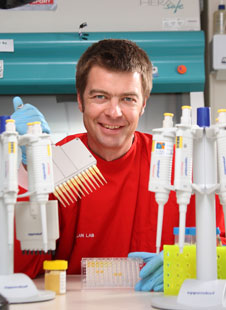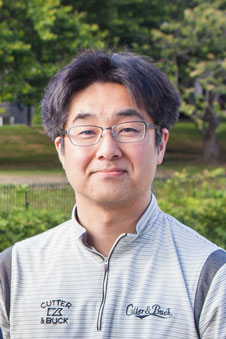 Thursday 8 June 2017 11:48am
Thursday 8 June 2017 11:48am
Associate Professor Alex McLellan
A new technique to make modern cancer treatment safer was the winner at the University of Otago annual Proof of Concept competition.
Associate Professor Alex McLellan and Dr Yoshio Nakatani of the Department of Microbiology & Immunology have developed a strategy to make modern cancer immunotherapy safer, by reducing the sometimes lethal “cytokine storm” that occurs in a proportion of patients.
“Immunotherapy has a very bright future. But some trials have been stopped due to fatalities caused by over-stimulation of the immune system. Our idea is to make cancer treatment safer,” says Associate Professor McLellan.
Associate Professor McLellan's research skills are in immunotherapy, while Dr Nakatani is an expert in solving the crystal-structure of proteins. The collaboration developed after a stairwell conversation between Drs McLellan and Nakatani.
“When we checked the structures of the drugs, we realised our engineering principles were workable and we were onto something good,” says Dr McLellan.

Dr Yoshio Nakatani
“I had been thinking about failsafe systems to make cancer treatment safer for patients. I hit on a simple idea that is the basis for the invention, but I could not initially tell if the idea was feasible.
“Yoshio, one of the best protein structure scientists in Australasia, was fascinated by the design. He then checked the structures and showed that the idea was possible.”
The chair of the judging panel Dr Andrew Kelly of BioPacific Partners says the quality of this year's entries was, in his experience, high. It was a difficult decision to make.
“We had trouble picking a winner. We went back and forth over several entries for some time. I have chaired this contest for quite a few years now and am impressed by both the quality and variety”, Dr Kelly said.
Otago Innovation Chief Executive Pete Hodgson said that many of the projects in the competition are “investable”.
“It has been an impressive display of intellectual horsepower. Projects ranged from making a more efficient heat pump to a new heart test.”
The idea has the potential to make a major difference to cancer treatment worldwide, Associate Professor McLellan says.
“The use of this type of cell therapy is increasing with over 300 current trials, and it is predicted to become the standard therapy for many cancers. With one third of us likely to develop cancer, the invention will have a wide utility.”
Dr Nakatani says it is a great privilege to win the competition.
“I'm very pleased and excited that I can use my expertise to support Alex's idea and to technically contribute to his project design.”
For more information, contact
Associate Professor Alexander McLellan
Department of Microbiology & Immunology
University of Otago
Tel 03 479 7728 (Office)
Tel 03 479 7147 (Lab)
A list of Otago experts available for media comment is available elsewhere on this website.
Electronic addresses (including email accounts, instant messaging services, or telephone accounts) published on this page are for the sole purpose of contact with the individuals concerned, in their capacity as officers, employees or students of the University of Otago, or their respective organisation. Publication of any such electronic address is not to be taken as consent to receive unsolicited commercial electronic messages by the address holder.